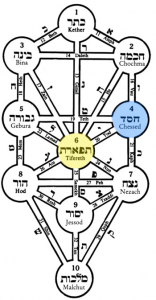Counting the Omer Day 15: Chesed of Tiferet
 The personality trait we focus on during this third week of the counting of the Omer is tiferet.
The personality trait we focus on during this third week of the counting of the Omer is tiferet.
Tiferet literally is “beauty,” but it’s about a lot more than beauty. Tiferet is fundamentally about compassion and balance. Tiferet represents the balance between chesed (love) and gevurah (strength/discipline/judgment). Tiferet is also associated with truth.
There is a real connection between beauty and balance; studies show that it’s universal to see a symmetrical face as more beautiful than an asymmetrical face. As I recall, this is not cultural – it seems to be hard-wired into us, which makes sense because an asymmetrical face could be an indicator of some sort of medical issue, which biologically would make the person a less desirable mate. Thank God we can transcend our biological programming, etc., but we do seem to be programmed to see balance, symmetry, as beautiful.
Compassion is a blend of love and judgment. You can love anyone; but compassion is only aroused for someone who is first judged to be needy or in pain or trouble. We are cautioned against judging others strictly, but rather we should have compassion and give people the benefit of the doubt.
Kabbalah teaches that the world could not exist if it were either all chesed or all gevurah. All chesed and the world would disappear, as the rays of the sun inside the sun. Too much light. And none of us could survive strict judgment – we are all flawed. So in a sense the world only exists because of tiferet, the balance between chesed and gevurah.
We also need balance in our lives. Think of what it means when we say someone is “unbalanced,” or “knocked out of kilter.” Meditators are taught to seek their center.
Today’s aspect of tiferet that we consider is chesed, or love. It might seem a little odd to consider the “love aspect of compassion,” but it’s not. Compassion can be impersonal; love is personal. Writing out a check to a charity that helps homeless people is an act of compassion. When you turn toward a homeless beggar on the street and not only give him/her something, but acknowledge his/her existence with eye contact and a smile – you are expressing compassion with love. You are showing chesed of tiferet. This is the ideal way to show compassion toward others.
For a deeper exploration of the topic of how we give to beggars, see my blog post from Ki Tisa 5765, “Giving to Everyone.”
May you not only have compassion, but may your compassion be expressed with love and care.
Back to Day 14

Pingback: Counting the Omer Day 16: Gevurah of Tiferet - The Neshamah Center | The Neshamah Center